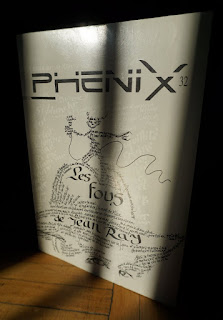 Thomas Ligotti on Robert Aickman
Thomas Ligotti on Robert Aickman
"I'll have to leave it to admirers of Robert Aickman, which I am not one, to comment on the essays treating his work. C.P.M.'s piece seemed to display the greater critical deftness; but the subject, whom Russell Kirk called "the greatest living writer of ghost stories" when he lived, is not one I warm up to, living or dead. Too many unrewarding hours spent pondering his ineffectual subtleties, too many frustrating revelations when I finally discovered the thematic key to a tale, only to find a crude closet of cliches behind the door. It's probably my innate vulgarity which prevents me from appreciating Aickman's "obscurity" but it is not for lack of effort that I cannot.”
--Nyctalops no. 19, 1991
Tibet: Robert Aickman?Ligotti: A writer that many people assume that I like because his "strange stories" are so obscure. They are indeed.
Stefan Grabiński on Hanns Heinz Ewers
“His comparison to Ewers was not very apt, Ewers being a shallow sensationalist, whom Grabiński considered a charlatan and was constantly outraged whenever he was set side by side with the author of Alraune.” *
--Artur Hutnikiewicz in „Twórczość Literacka Stefana Grabińskiego”
Algernon Blackwood on H. P. Lovecraft
"I have read Lovecraft with keen enjoyment but, while appreciating to the full his gorgeous imagination and feeling for atmosphere, the thrill of Fear I demand in such stories did not come. He has the material in plenty, in more than plenty, but I am oppressed rather than thrilled by what I feel to be overloading. There is a piling up and up of detail that, for me, defeats its own end. From a comment in your own letter about this I feel you partly agree with me that he is never wholly what we call 'master of his material' and that the cumulative effect is a bit bludgeoning on the mind. I long for something to be left to the imagination, suggested, insinuated, instead of forced upon me with an adjectival wealth that tends to weary. I also do not react sympathetically to his preoccupation with corpses and decay; indeed, it was all I could do to finish reading his 'Rats in the Wall,' a tale that stirred repulsion rather than woke horror. What we call 'spiritual horror' stirs fear in me while physical horror leaves me unresponsive, even antagonistic. For instance, I find a climax of sheer spiritual horror in the 'Turn of the Screw,' the ghastly menace to the souls of the two children, though this hideous tale, I notice, is not among your favourites. I am interested that we should disagree here. I can't read the 'Screw' even in daylight without a genuine shiver down my spine, whereas no one of Lovecraft's stories really held me at any point. For that matter, neither Monty James nor Bierce have ever frightened me, tho' Machen once or twice nearly achieved this and your letter mentions other stories that have also managed really to scare me!"
--Algernon Blackwood writing to
Allen McElfresh
"Lovecraft, too, I find extremely interesting, though I could wish that his exuberant and powerful imagination were a little less preoccupied with the 'physical' horror of decay. What I look for always in this field, and what I depend on for the authentic thrill, is spiritual horror. And I feel sure you will not resent this minor criticism."
--Algernon Blackwood writing to
August Derleth***
Thomas Owen on Jean Ray
“In his works the monster breaks through the door, whilst in mine he blows a puff of smoke through the keyhole. Whereas he [Ray] storms into the everyday life, I subtly creep into it. This is very different. In the works of Jean Ray, there is initially little terror coming from within, as it is usually caused by extraordinary, inexplicable events coming from the outside that affect people. In my fiction, I think the terror comes from within the characters and it gives trivial and commonplace events gravity that is revealed only to the character and which I reveal to the reader.”****
--Phenix no. 32, September 1992, p.
28
H. P. Lovecraft on Joseph Sheridan Le Fanu
“Just now I am making a bold effort to keep awake over an old Victorian novel which some damn’d misguided oaf recommended to me as “weird”—J. Sheridan Le Fanu’s “House by the Churchyard”. I had been disillusioned before by Le Fanu specimens, & this one just about clinches my opinion that poor Sherry was a false alarm as a fear monger, & I shall cut him out of any possible 2nd edition of my historical sketch [i.e. “Supernatural Horror in Literature”].”
--H. P. Lovecraft writing to August
Derleth on 26 September 1929*****
______________
*“Nie bardzo mu się z resztą udało to porównanie z Ewersem, dość płytkim
poszukiwaczem sensacji, którego Grabiński uważał za szarlatana i zżymał się
stale, ilekroć zestawiano go z autorem Alrauny.”
**with thanks to Bendk and MadsLPL from TLO.
***these portions of the letters were reprinted in Crypt of Cthulhu #51 in the article "Lovecraft & Blackwood: A Surveillance" by Mike Ashley. Alas, the author of the article does not provide any dates.
****”Chez lui, le monstre fracasse la porte. Chez moi, le monstre souffle un peu de fumée par le trou de la serrure. Lui fait irruption dans le quotidien, moi je m’insinue sournoisement dans le quotidien. C’est très différent. Chez Jean Ray il y a d’abord un peu de terreurs internes; sa terreur est toujour liée à des événements extraordinaires, inexplicable, qui accablent l’homme mais qui viennent du dehors. Chez mois, je pense que l'épouvantable naît beaucoup plus de l’intérieur du personnage, parce-que celui-ci donne à des événements infimes et quotidiens une importance qui n’est révélée qu’à lui-même et que moi je révèle au lecteur.”
*****Essential Solitude: The Letters of H. P. Lovecraft and August Derleth, 2016, p. 216
(my own translations from French and Polish)


No comments :
Post a Comment